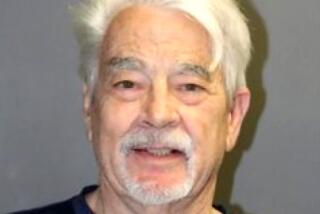Jurors Reject Allegation of Indirect Sexual Harassment : Trial: In a landmark case, a nurse sued a doctor over his physical contact with others in the operating room at San Pedro Peninsula Hospital. Jurors reached their verdict in less than seven hours.
- Share via
A Torrance jury has rejected a San Pedro nurse’s claims that she suffered emotional distress from witnessing what she considered sexual harassment carried out by a prominent South Bay doctor.
The decision came in a landmark “environmental sexual harassment” lawsuit in which the nurse sought damages as a witness to--not as the direct target of--sexual harassment in the workplace.
Acting on a lawsuit filed by former surgical nurse Julie Fisher, the Torrance Superior Court jury decided that Dr. Barry Tischler did not engage in sexual harassment at San Pedro Peninsula Hospital, where he is a staff obstetrician and gynecologist.
The jury, which deliberated less than seven hours, also decided that the hospital was not liable for Tischler’s alleged misconduct.
Composed of eight women and four men, the jury voted 9-3 in favor of Tischler. Two men and one woman sided with Fisher.
“It was a difficult six years,” Tischler said Tuesday after the decision was announced, referring to the time it took for the case to get to trial. “I feel justice was served.”
The lawsuit was filed in 1987 seeking damages for numerous acts of sexual harassment that Fisher witnessed, but did not directly experience over a year starting in September, 1985.
In 1990, ruling on Fisher’s lawsuit, the state Supreme Court said employees who are not direct targets of sexual harassment can seek damages against their employers if they can prove the harassment was so pervasive it created a hostile workplace.
The Tischler case was the first such case to go to trial in California.
Fisher claimed that Tischler repeatedly hugged and fondled nurses in sexually suggestive ways and made off-color sexual comments about patients under anesthesia.
The acts allegedly occurred from 1981, when she started working at the hospital, until 1986, when she resigned under duress. Fisher could only collect damages for incidents between September, 1985, and September, 1986, under the statute of limitations imposed by state employment laws.
Tischler denied any sexual misconduct, saying any hugging or physical conduct was done with the consent of the nurses as a way to ease the tension of the operating room. Several nurses took the stand in his defense, testifying not only that they didn’t consider the doctor’s behavior offensive, but they welcomed it. They likened the atmosphere and relationship among staff to a family.
According to testimony, Tischler had apologized to Fisher for a 1982 incident in which he hugged her so tightly that she suffered torn rib cartilage. Both Tischler and Fisher testified that the doctor avoided her after the incident, but Fisher said he continued harassing other nurses.
No nurses or hospital staff backed up Fisher’s claims, prompting her lawyer, Peggy Garrity, to portray her as a lone warrior breaking a “conspiracy of silence.” If the operating room staff was like a family, Garrity said, it was a “dysfunctional” and “incestuous” one.
“The people in the operating room and myself were put in a terrible light,” Tischler said. “This was not only hard for me but also for the people in the operating room. It’s a very warm, supportive group and a very caring group.”
He declined to comment further.
Garrity said Fisher was “devastated” and “exhausted” by the trial “but she’ll go on.” Fisher could not be reached for comment.
Likening Fisher to Anita Hill, the Oklahoma law school professor who one year ago leveled sexual harassment charges at Supreme Court nominee Clarence Thomas during his Senate confirmation hearings, Garrity said: “Clarence Thomas also made it to the Supreme Court and Anita Hill took a difficult, painful step and she made a difference. Slowly, there will be changes here.”
Garrity said “I think it’s a fair bet” that Fisher will appeal the decision.
Grounds for an appeal include Superior Court Judge Mort Franciscus’ decision not to allow Fisher to introduce character evidence about Tischler, including statements from Tischler’s former wife that he engaged in unusual and abusive sexual practices and a statement from a patient that Tischler raped her in 1982, Garrity said.
She also said the judge should not have allowed testimony from other nurses that Tischler’s conduct was not offensive to them, calling such comments irrelevant because Fisher was the victim, not other staff members.
Some jurors said they indeed were swayed by the nurses’ testimony supporting Tischler, but they also did not believe Fisher had a reasonable view of what constituted sexual harassment.
Tischler’s lawyer, John Kelly, had argued that Fisher saw sexual innuendo in innocent affection among the staff.
“I don’t think she was a reasonable woman,” said jury foreman Elizabeth Keesal, a flight attendant. In Fisher’s mind, Keesal said, an example of sexual harassment could be someone standing too close behind her.
Another weakness in Fisher’s case was that “they had no one else come forward on their side,” Keesal added.
“I just didn’t feel there was any sexual harassment,” said juror Pam Aleccia, a secretary. “I thought Dr. Tischler was the victim. I just felt terrible that he went through this so long.”
But other jurors disagreed, saying Fisher’s own testimony describing the acts of harassment and the effect on her convinced them she was telling the truth.
“I thought what she said was true,” said juror Curtis Lancon, a retired aerospace engineer. “The driving factor in the whole thing was the definition of a reasonable woman and I thought she was and she was offended. She presented enough evidence as far as I was concerned.”
Neither Garrity, Kelly nor Linda Miller, the lawyer for the hospital, said they believe the outcome of this case will put a chill on environmental sexual harassment cases.
Kelly and Miller said they agree with the principle of the law, but that each case must be judged on its own merits. They said Fisher lost the case because she had an unreasonable perception of sexual harassment and that she failed to offer enough evidence.
Garrity said that over time, as women become less tolerant of sexual harassment, “tough” cases like Fisher’s will become more commonplace.
More to Read
Sign up for Essential California
The most important California stories and recommendations in your inbox every morning.
You may occasionally receive promotional content from the Los Angeles Times.










